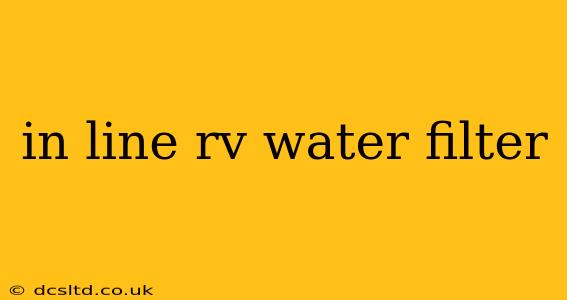The open road beckons, promising adventure and relaxation. But before you hit the highway in your RV, there's one crucial element to ensure your trip is truly enjoyable: clean, safe drinking water. An in-line RV water filter is your first line of defense against contaminants that can lurk in campground water sources. This comprehensive guide will help you understand the importance of in-line filtration, how to choose the right filter for your needs, and how to maintain it for optimal performance.
What is an In-Line RV Water Filter?
An in-line RV water filter is a compact device that installs directly into your RV's water line. Unlike larger, under-sink filters, these are designed for ease of installation and maintenance, making them ideal for RVers. As water flows through the filter, sediment, chlorine, and other undesirable substances are removed, leaving you with cleaner, better-tasting water for drinking, cooking, and showering.
Why Use an In-Line RV Water Filter?
The water quality in RV parks and campgrounds can vary significantly. You might encounter sediment, chlorine, bacteria, or other contaminants that can affect the taste and safety of your water. An in-line filter provides a crucial layer of protection, ensuring your water is safe for consumption and protects your RV's plumbing system from damage caused by sediment build-up.
What are the benefits of using an in-line RV water filter?
- Improved Water Taste and Odor: Chlorine and other chemicals often added to municipal water supplies can leave an unpleasant taste and odor. In-line filters effectively remove these, leaving you with fresher-tasting water.
- Reduced Sediment: Sediment, including sand, rust, and dirt, can clog pipes and damage appliances. An in-line filter prevents these particles from entering your RV's water system.
- Healthier Drinking Water: While not all in-line filters remove all bacteria and viruses, many remove chlorine and sediment, both of which can contribute to health problems. For enhanced protection against microbial contamination, consider a filter with a higher micron rating or a carbon filter.
- Extended Appliance Lifespan: By preventing sediment and contaminants from reaching your appliances, an in-line filter helps extend the lifespan of your water heater, refrigerator, and other water-using devices.
- Easy Installation and Maintenance: In-line filters are typically simple to install and replace, requiring minimal tools and expertise.
How to Choose the Right In-Line RV Water Filter
Selecting the best in-line RV water filter depends on your needs and preferences. Consider these factors:
- Filter Type: Common filter types include sediment filters (removing particles), carbon filters (removing chlorine and odor), and combination filters (removing both).
- Micron Rating: This indicates the size of the particles the filter can remove. A lower micron rating means the filter can remove smaller particles.
- Flow Rate: This measures how much water the filter can process per minute. Higher flow rates are beneficial for households with higher water demands.
- Filter Life: Check the manufacturer's specifications for the filter's lifespan, typically measured in gallons of water filtered.
- Size and Compatibility: Ensure the filter is the correct size for your RV's water line and fittings.
How Often Should I Replace My In-Line RV Water Filter?
The frequency of filter replacement depends on several factors, including water quality, usage, and the filter's rated capacity. However, most manufacturers recommend replacing in-line RV water filters every six months or after a certain number of gallons filtered, whichever comes first. Always consult the manufacturer's instructions for specific guidance.
What are the signs that my in-line RV water filter needs replacing?
- Reduced Water Flow: A significant decrease in water pressure suggests the filter is clogged.
- Unpleasant Taste or Odor: If your water tastes or smells bad despite having a filter, it's a sign the filter needs changing.
- Visible Sediment: If you see sediment in your water, the filter is likely failing to do its job.
Can I Use an In-Line RV Water Filter for Showering?
Yes, an in-line RV water filter can improve the quality of your shower water. However, some filters may not be designed for the high flow rates required for showering and might reduce water pressure significantly. Look for filters specifically marketed for whole-house use or those with a high flow rate.
What are the different types of in-line RV water filters available?
There's a wide variety of in-line RV water filters available, each with unique features and capabilities. Some popular types include sediment filters, carbon filters, and combination filters. Sediment filters remove physical particles like sand and rust, carbon filters reduce chlorine and improve taste and odor, while combination filters offer both benefits. You can also find filters that address specific contaminants such as heavy metals or pesticides, depending on your water source and needs.
This guide provides a comprehensive overview of in-line RV water filters. Remember to choose a filter that best suits your individual needs and remember to replace it regularly to ensure clean, safe, and enjoyable drinking water throughout your RV adventures.
